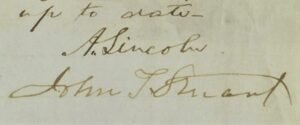LINCOLN AND HIS FIRST LAW PARTNER, JOHN T. STUART
JOINTLY ACKNOWLEDGE PAYMENT OF $50 FOR THEIR LEGAL SERVICES
LINCOLN, ABRAHAM. (1809-1865). President of the United States; assassinated. Exceedingly-rare and Choice [apparently unpublished], Autograph Document Signed, “A. Lincoln” in his capacity as attorney. No place [Springfield, Illinois]], April 7, 1854. One page, oblong narrow octavo. [approx 4 x 8 inches]. Matted and framed in a simple black lacquered frame. Lincoln pens: “Received, April 7, 1854 of Mrs. Lucy Scroggin – fifty dollars in full of all fees up to date – A. Lincoln”. Also countersigned ‘John T. Stuart’ by Lincoln’s first law partner.
JOHN T. STUART (1807-1885) was Abraham Lincoln’s first law partner and the first cousin of Abraham Lincoln’s wife, Mary Todd. Stuart graduated from Centre College in Danville, Kentucky, at the age of nineteen. He studied law in Richmond, Kentucky, and was admitted to the bar in 1827. In the fall of 1828, Stuart settled in Springfield, Illinois, where he began a law practice – becoming the town’s sixth lawyer. During the Black Hawk War, Stuart was a major of the local regiment in 1831, and in 1832, served as a private alongside Lincoln in Captain Elijah Iles’ company of the 4th Regiment of Illinois Mounted Volunteers. When he returned to his practice, Stuart formed a law partnership with Henry E. Dummer. Stuart also became active in Whig politics and served in the Illinois House of Representatives in 1832 and again in 1834. His partnership with Dummer ended in 1837, after which he partnered with Lincoln. In 1838, he defeated Stephen A. Douglas in a bid for a seat in the U.S. House of Representatives, and was reelected in 1840. In 1841 Stuart and Lincoln dissolved their legal partnership—in which they had handled at least seven hundred cases. [Papers of Abraham Lincoln.org]
1854 was a pivotal year in the life of Lincoln. On May 30th – The Kansas-Nebraska Act was passed. The passage of this act brought Lincoln back into politics. On October 16th, in Peioria, Lincoln first spoke out against the Kansas-Nebraska act, and called slavery “immoral”. On November 7th – Lincoln was re-elected to the Illinois legislature, but withdrew from office 20 days later to pursue a run for the US Senate, a race he eventually quit. Lincoln dropped out of the race so that the Republican Party would be guaranteed a win for the Senate seat. He directed his support to Lyman Trumbull. [courtesy National Park Service].
This is an exceptional piece for the presidential collector, or the legal specialist interested in acquiring something other than the legal brief fragments which can be readily found on the market, and is many times rarer than Lincoln’s partly-printed checks. Just superb!
$28,500.00

